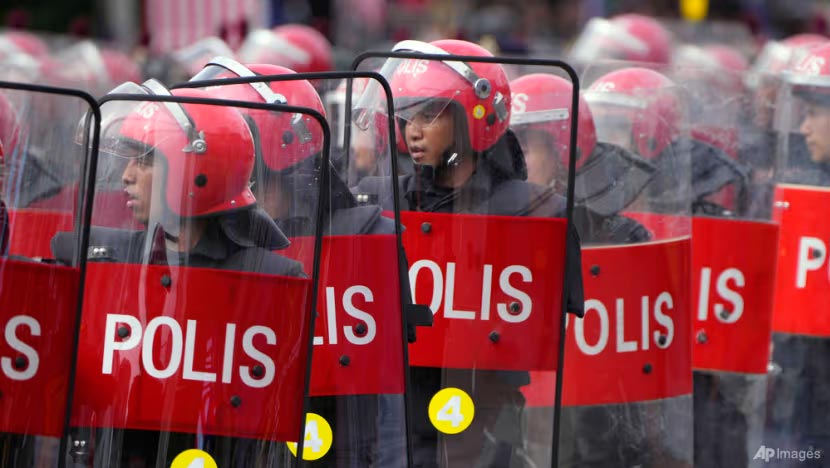By Rhea Yasmine Alis Haizan | Channel News Asia

A latest slew of scandals involving the Malaysian police, including allegations against one for raping a foreign student, has cast the spotlight on the membership of an independent body tasked to probe complaints against the men in blue, but even that has come under fire.
On Jan 10, Home Minister Saifuddin Nasution Ismail revealed the names of five members appointed to the Independent Police Conduct Commission (IPCC), with two spots yet to be filled.
According to Free Malaysia Today (FMT), Mr. Saifuddin said that the IPCC has the prerogative to kickstart an investigation in the public interest without referring to any party or report.
But analysts and activists are already describing the body as “toothless”, given its limited powers.
“The IPCC has no disciplinary power over police officers who … are found to have committed (an act of) misconduct,” International Islamic University Malaysia (IIUM) law expert Dr. Nik Ahmad Kamal Nik Mahmood told CNA.
Dr. Nik Ahmad explained that the IPCC can only provide punishment recommendations to the police force commission, adding that it is ultimately up to the police disciplinary committee to determine and undertake action.
Malaysian lawyer Edmund Bon agreed that the IPCC wields very limited power.
“It is in essence more of a referral commission,” said Mr. Bon, noting that the previously proposed Independent Police Complaints and Misconduct Commission (IPCMC) had more powers and a direct enforcement mandate.
“The IPCMC came about after many years of consultation and problems that we see with the police force. But the police force objected to it (because they didn’t want to be policed) and therefore you have a watered-down version of it (through the IPCC).
“So police accountability will still be quite low because you don’t have a strong police commission or force, something like Hong Kong or other countries,” he told CNA.
Who polices the police?
Mr. Bon said that the limited power of the IPCC makes it a challenge in winning over public support, but said that it may help if the remaining two members of the IPCC are from the civil society and those who work with communities.
“(Such people would be able to) understand the situation on the ground,” he said.
According to local media, the position of IPCC chairman will be taken up by former director-general of the implementation coordination unit of the Prime Minister’s Department (PMD) Zolkopli Dahlan.
The IPCC deputy chairman spot will be filled by former PMD advisory board chief director Mohamad Jazamuddin Ahmad Nawawi.
Other members of the commission include former senior director of the Malaysian Anti-Corruption Commission (MACC) Tan Kang Sai, former Royal Malaysia Police logistics and technology department deputy director Shukri Abdullah and former national audit department (financial sector) director Martina @ Kartina Zamhari.
When questioned on Jan 10 over the decision to confirm five selected members first, Mr. Saifuddin said that the ministry was still headhunting the right candidates with stellar records and appropriate expertise for the final two posts, according to Free Malaysia Today.
Dr. Nik Ahmad noted that with the appointment of the five IPCC members, the commission can begin working on any complaints immediately.
However, with two spots yet to be filled in the commission, he said that the IPCC should appoint former judges as members in order to add credibility to the commission.
To improve public trust in the police, any IPCC recommendation to take stern action against police officers must be taken seriously by the police disciplinary committee, he said.
He added that the police must portray a friendly, clean, and progressive image.
“There are bad apples, and this is where the police must take stern action against the wayward officers,” he urged.
The controversial IPCC Bill was first tabled in August 2020 under the Perikatan Nasional (PN) government, following the “Sheraton Move” in February that year.
The “Sheraton Move” was a political manoeuvre which saw the fall of the previous Pakatan Harapan (PH) government that had proposed the IPCMC Bill in July 2019.
The IPCMC, unlike the IPCC, would have had the enforcement power to exert discipline authority over errant officers, according to the Malaysian Bar, a professional body tasked with regulating the legal profession.
The introduction of the IPCC Bill, in replacement of the IPCMC Bill, drew criticism from advocacy groups and cabinet members for failing to address police abuse of power.
The IPCC came into force on Jul 1. According to local media, Mr. Saifuddin said in October last year that the process of selecting the seven commission members is underway.
He did not elaborate on why it had taken so long since the commission was first tabled to start the selection process.
A spate of police misconduct
In a Facebook post on Jan 11, Turkish-American academic Ahmet T. Kuru claimed that he was close to being arrested at the Kuala Lumpur International Airport on Jan 10 before his flight to Lahore, India after being identified as a “terrorist” by plainclothes police officers.
Inspector-General of Police (IGP) Razarudin Husain then denied the claims, saying that checks had shown that no policeman had approached Mr. Ahmet, according to a Free Malaysia Today report on Jan 11.
Rights group Citizen Against Enforced Disappearances (Caged) has since questioned if the IPCC will help the police cover up the alleged incident.
“The brisk denial by the IGP of Kuru’s claims – without the depth of investigation which is warranted because Malaysia is a state of abductions and disappearances – simply proves the point that there is a need for independent oversight of the police.
“The so-called IPCC is a toothless, limbless creature which satisfies only the need of the police for tools to cover up its failures,” Caged spokesperson Rama Ramanathan was quoted as saying by Malaysiakini.
In a separate case two policemen were arrested for extortion and sexual assault.
According to a New Straits Times (NST) report, Selangor police chief Hussein Omar Khan said in a statement that one of the suspects sexually assaulted a female college student, while a male college student was taken to a bank to settle payments demanded by the suspects for traffic offences.
In December last year, three policemen were arrested on suspicion of stealing RM85,000 (US$18,100) from a premise during a recent raid on immigrants in Kuala Lumpur’s Jalan Silang, in an area known as “mini Dhaka”.
The same month a senior police officer was charged in Perak with the murder of a secondary school student in a hit-and-run accident. The victim had reportedly died after his motorcycle was hit by a car driven by a man working at the Kedah police headquarters.
According to a report by The Star on Tuesday, the IGP said that about 2 per cent of the police force – or about 2,740 personnel – have been found to have committed wrongdoings last year.
He urged police officers in Malaysia to carry out their duties with integrity, adding that wrongdoers will face severe consequences.
“No crooked cop will be tolerated or spared from stern action,” Mr. Razarudin reportedly said.
Source: https://www.channelnewsasia.com/asia/malaysia-police-commission-ipcc-misconduct-4050961



